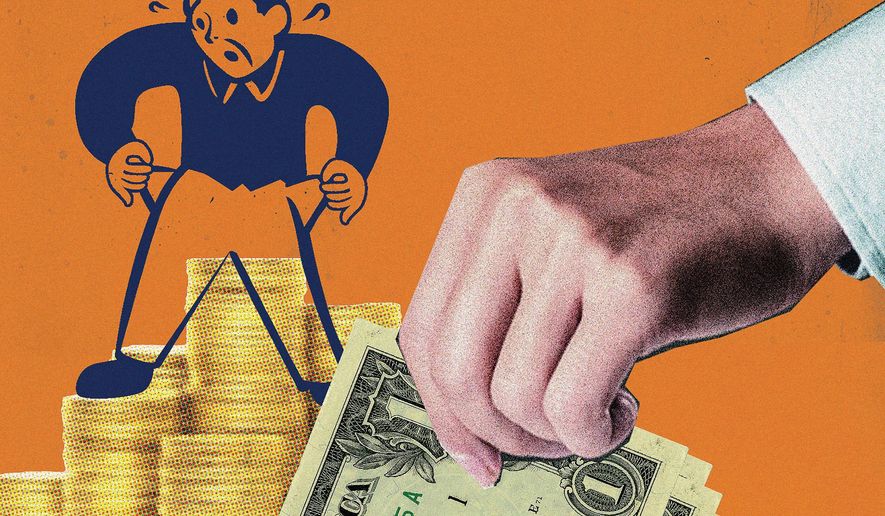OPINION:
If you had been aware of the following facts, would you have voted for the just-passed climate and health care bill? The bill includes major tax increases (including tax increases on people at all income levels), greatly increases government spending and will provide for the IRS to hire 87,000 more agents to harass you. (Advocates for the bill claim those new agents will only audit the super-rich — of which there are too few for all the new agents to audit — so they clearly will be coming for you.)
Over the last 40 years, many studies have shown that in almost all major countries, the level of government spending is much higher than it should be to maximize the long-term growth in real per capita incomes. Governments most often lack the necessary incentives for proper resource allocation, innovation and worker productivity — so it is no surprise that socialist economies eventually fail.
When tax rates are too high, economic growth and the rise in per capita incomes slow and can even become negative, as can tax revenue. Although this fact has been known for a long time, it has become popularized as the Laffer curve effect, named after the brilliant economist Arthur Laffer, who has best explained it to the political and media class, as well as the world at large. Mr. Laffer and others have been particularly articulate in explaining the destructive effects of high taxes on labor and capital.
It also has been well understood that regulations can be beneficial or destructive if they don’t meet proper cost-benefit tests. All sports have sets of rules that must be simple and clear enough for both players and fans to understand. Too much complexity can destroy the game. The same thing is true with rules for economic players (businesses and workers). Too many and too complex regulations can destroy any industry, leaving everyone worse off rather than better off. Many environmental regulations have reached the point where it is no longer cost-effective to produce some necessary products — including some of the best pesticides and fertilizers.
The new $739-billion bill that Congress just passed — on party-line votes — fails on spending restraint and tax destructiveness. According to a number of nonpartisan experts — like the Tax Foundation and the Congressional Budget Office — the bill will do almost nothing to reduce inflation or improve the environment in the next few years. The question then is why so many members of Congress voted for it. Some were clearly ignorant of the effects. They either chose not to inform themselves or didn’t understand the arguments of the many distinguished economists, civil libertarians and knowledgeable others who opposed it. Most of those who approved it were probably bought off by their own political leaders who could give them goodies (plum committee assignments and better offices) or by special interests who were adept at providing tangible benefits (e.g., overly generous speaking honorariums or travel, etc.) in one form or another.
Democracies suffer from a defect in that politicians can vote to benefit themselves and their allies. It would be an interesting exercise to go through the legislation and look at who benefits from each provision. All of those who produce parts for windmills or solar panels (including many Chinese suppliers) have a vested interest — whether or not it is beneficial for the climate. The Treasury Employees Union (the IRS is part of the Treasury) benefits from having more IRS agents, both in terms of power and dues revenue. Cops are taught to “follow the money” when trying to find who is behind a particular criminal enterprise — which, unfortunately, also applies to Congress.
The American people are increasingly “on to the game.” For years, polls have shown that Congress taxes and spends more than most voters wish. According to a recent Ballotpedia poll, “fifty-nine percent of voters believe that raising taxes hurts the economy.” In a Ballotpedia poll this past week, “only 31% of Americans trust the federal government to do the right thing most of the time”; and “64% of Americans believe there is a ‘deep state’ of career government employees who pursue their own interests and agendas.”
It is curious where the specific number of the demand for 87,000 new IRS agents came from. Interviews with taxpayers overwhelmingly show they want a smaller, less intrusive IRS, not a bigger one. What kind of people seek to have a career at the IRS? Back when I was a professor, I had many students who wanted to work someplace in government — but no one ever said they wanted to work for the IRS.
Do highly talented people who wish to serve their fellow man seek employment at the IRS? The satirical newspaper, the Babylon Bee, in a new article posed, “Want to Be One of the New IRS Agents? Here Are The 17 Job Requirements.” Among the 17 it lists are: “Must derive pleasure from human suffering”; “Unable to think for yourself”; “Proficiency in ignoring people who tell you to mind your own business”; and “Comfortable with firing RPGs at the homes of conservative activists with tax ‘discrepancies.’”
Satire only works when it has some relation to the truth. Should I now expect an IRS audit?
• Richard W. Rahn is chair of the Institute for Global Economic Growth and MCon LLC.




Please read our comment policy before commenting.